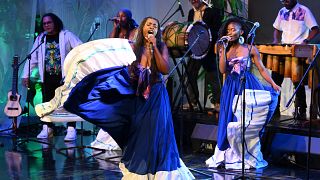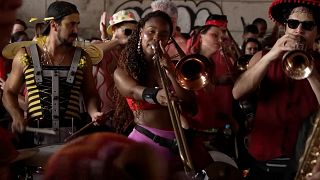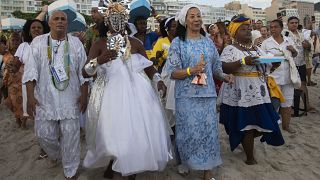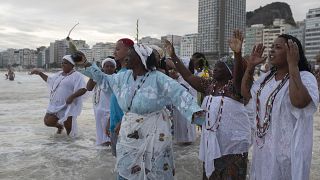Brazil
Yo mave have heard of Brazil's samba, bossa nova or forro but what about choro? The urban popular music genre was recently recognized as Brazilian cultural heritage.
A sound as unmistakably Brazilian as a samba beat, but only now is choro music official.
At the end of February, the Institute of National Historical and Artistic Heritage finally recognised the instrumental genre as Brazilian cultural heritage.
Considered the first characteristically Brazilian genre of urban popular music, the style was created during the 19th century in Rio de Janeiro.
Its survival today is partly down to choro circles or jam groups that meet at bars and clubs in Brazil's cities to play.
Every Monday or alternate Sundays, musicians bring their instruments to Serginho's Bar in the Santa Teresa neighbourhood of Rio for a jam session.
Flautist Naomi Kumamoto is a regular.
A former classical musician in her native Japan, she has been living in Brazil for 20 years.
"So I started searching and searching and I listened to popular music from many different countries. I was in Japan so I made my way down and listened to Mexican, Cuban, Colombian, Peruvian, many things and then I got to Brazil and discovered choro," says Kumamoto.
Another member of the circle, Pedro Aragão, is a mandolin player but also a researcher of the genre.
He was involved in the effort to get choro recognised as part of Brazil's heritage.
"We wrote a research 'dossier' supporting this point, that choro, though born in Rio de Janeiro at the end of the 19th century, became a nation wide music in the twenties and thirties and is now played all over Brazil," he says.
Born in the 19th century
The campus of UNIRIO university near Sugarloaf Mountain is another choro hot spot.
Teachers here give weekly lessons of all the main choro instruments.
One of the most popular among students is the four-stringed "cavaquinho."
"Cavaquinho is small and that's an advantage, it can be easily transported and it has lots of swing like our own Brazilian music," says teacher Ana Rabello.
The clarinet has had an important place in choro for over a century and students are taking part in the first class of the term.
They're learning a piece by one of the earliest choro composers, Joaquim Callado.
"When I found out there was a school that used the language of choro, I was thrilled. I enlisted and I'm in love with the school. It's been two years and I intend to stay. It's superb," says student Vitoria Elias.
Meanwhile, a traditional choro circle is gathering in the university's courtyard.
Led by a guitar teacher Rafael Mallmith, the session is part of the method used here for more advanced students.
The Portable Music School is at the forefront of teaching students to play in a choro, rather than classical style.
The genre's new status may mean more music schools offer this Brazilian alternative.
"Choro is not only a music genre, it's also a school. We must remember choro was born from musician's ingenuity here in Rio at the end of the 19th century. They heard the music that came from Europe in a two-dimensional paper score. They heard and recreated the music, playing by ear at popular gatherings. They'd listen to the music from the windows of the houses of the aristocracy and then went to lower class gatherings to play and re-invent this music, creating a new genre," says Jayme Vignoli, one of the directors of The Portable Music School.
By noon, students have spent all morning practising.
The next step is playing live.
More than 100 students of all levels congregate in the university courtyard.
"The 'bandão' or big band is a gathering of all the students at the school, beginners and more advanced, all together," explains director Paulo Aragão.
The concert at UNIRIO is open to the public, so every Saturday choro music comes alive, preserving the city's instrumental music tradition.













01:05
Indonesia becomes latest BRICS member
Go to video
Nathaniel Bassey to minister at U.S. inaugural prayer breakfast
02:20
RnB heavyweight Mario releases sixth album entitled 'Glad You Came'
02:10
Haiti's budding musicians hold concert amid ongoing gang violence
02:20
Les Blues du Fleuve: Baaba Maal’s Festival of Music and development in Podor
01:00
Rio de Janeiro's missing children